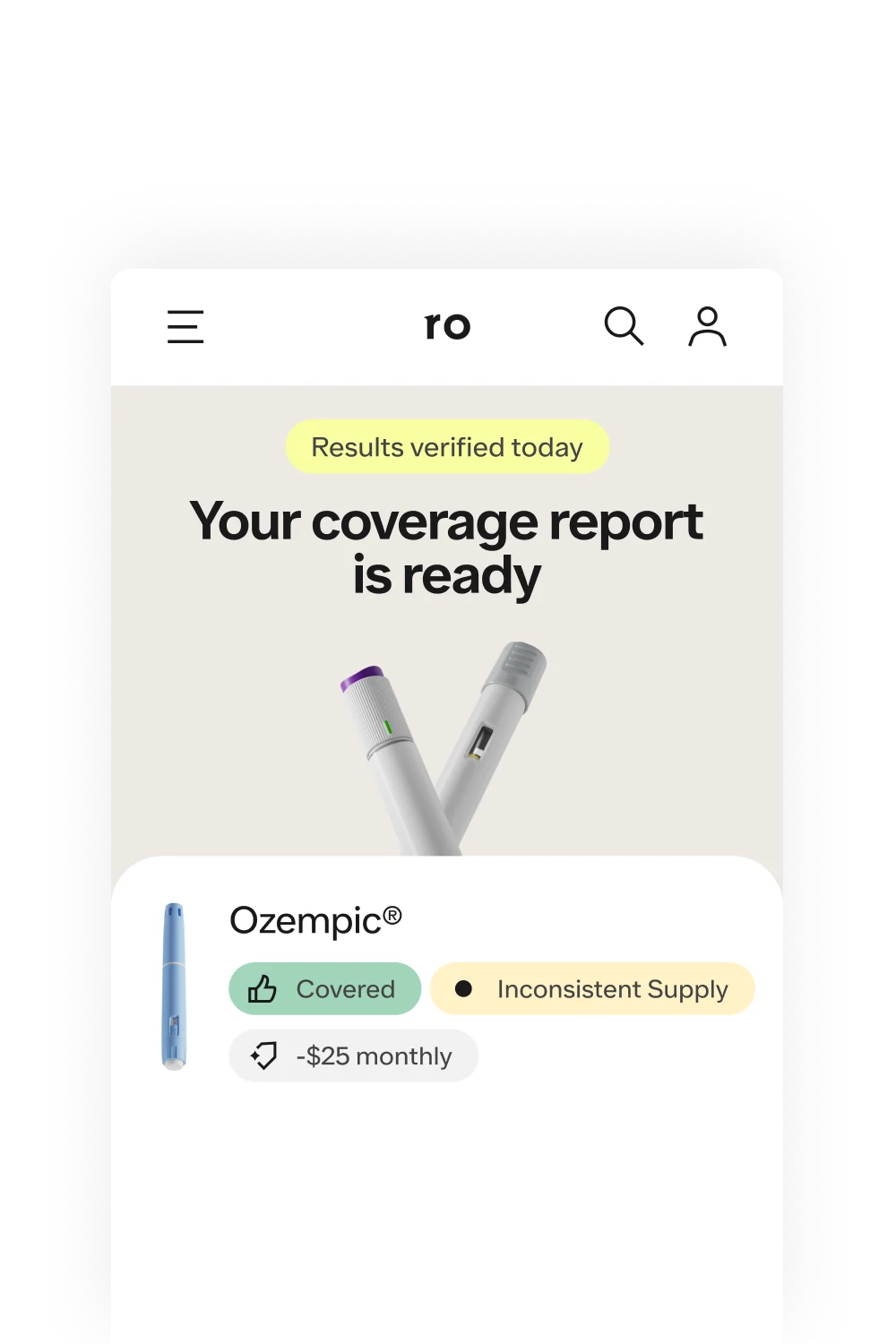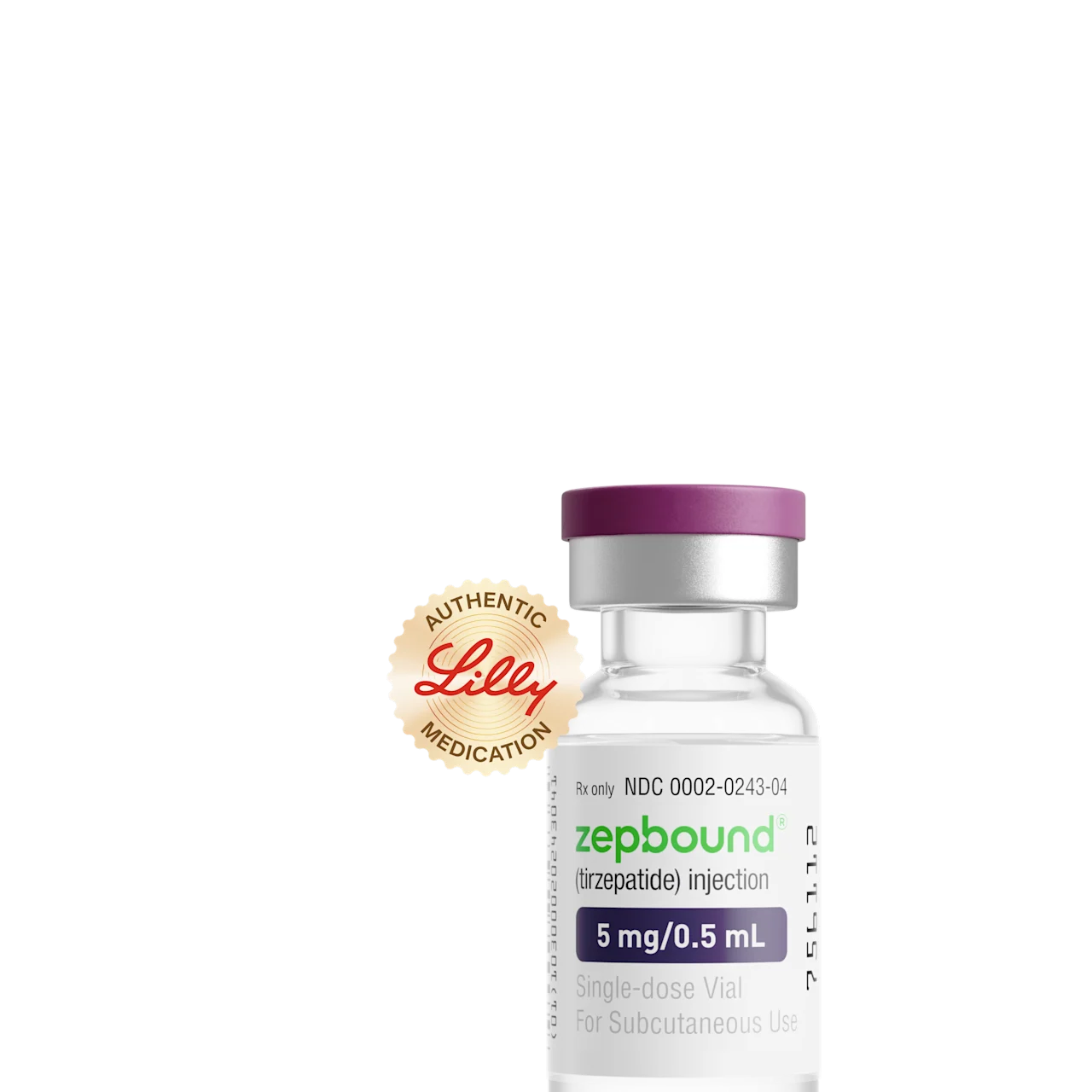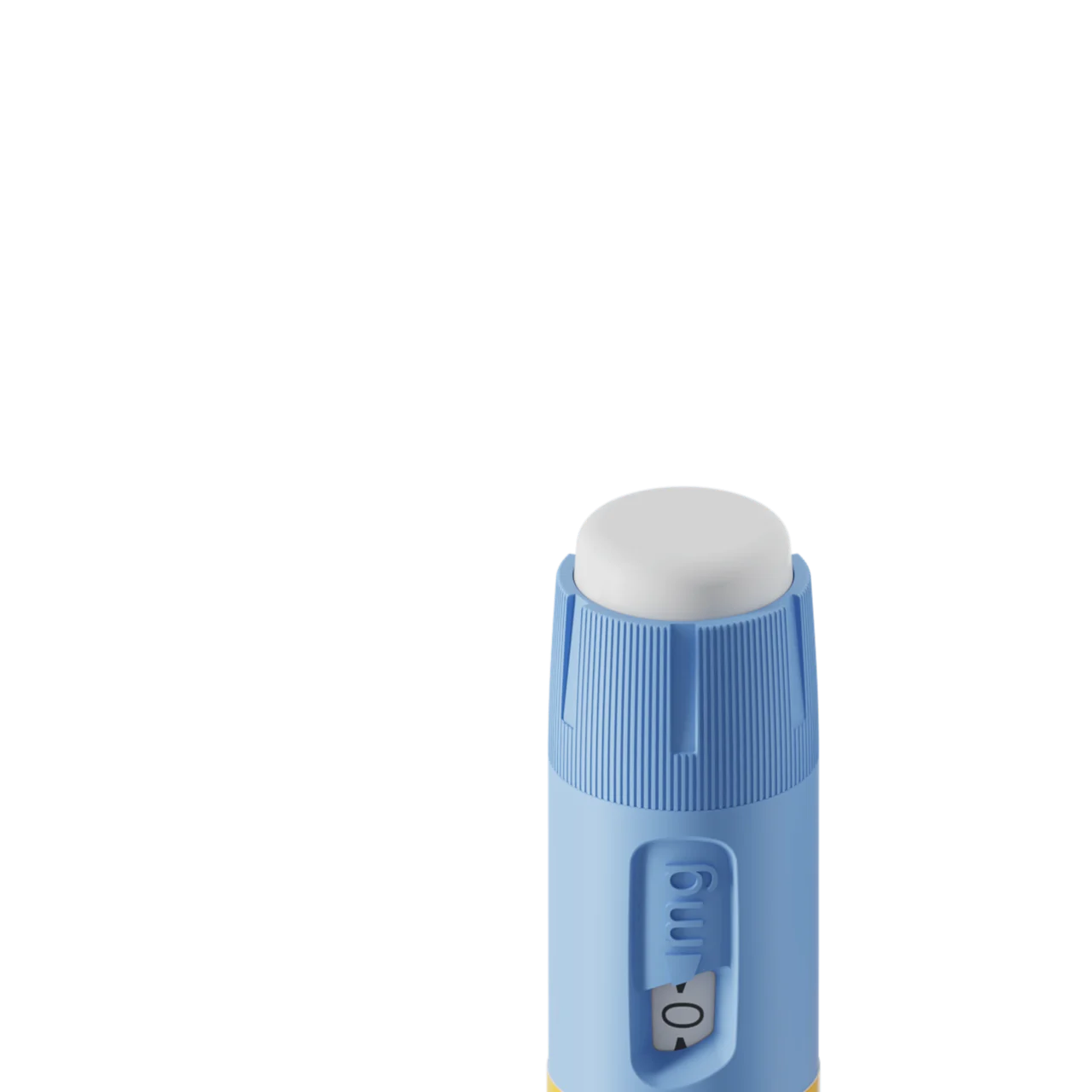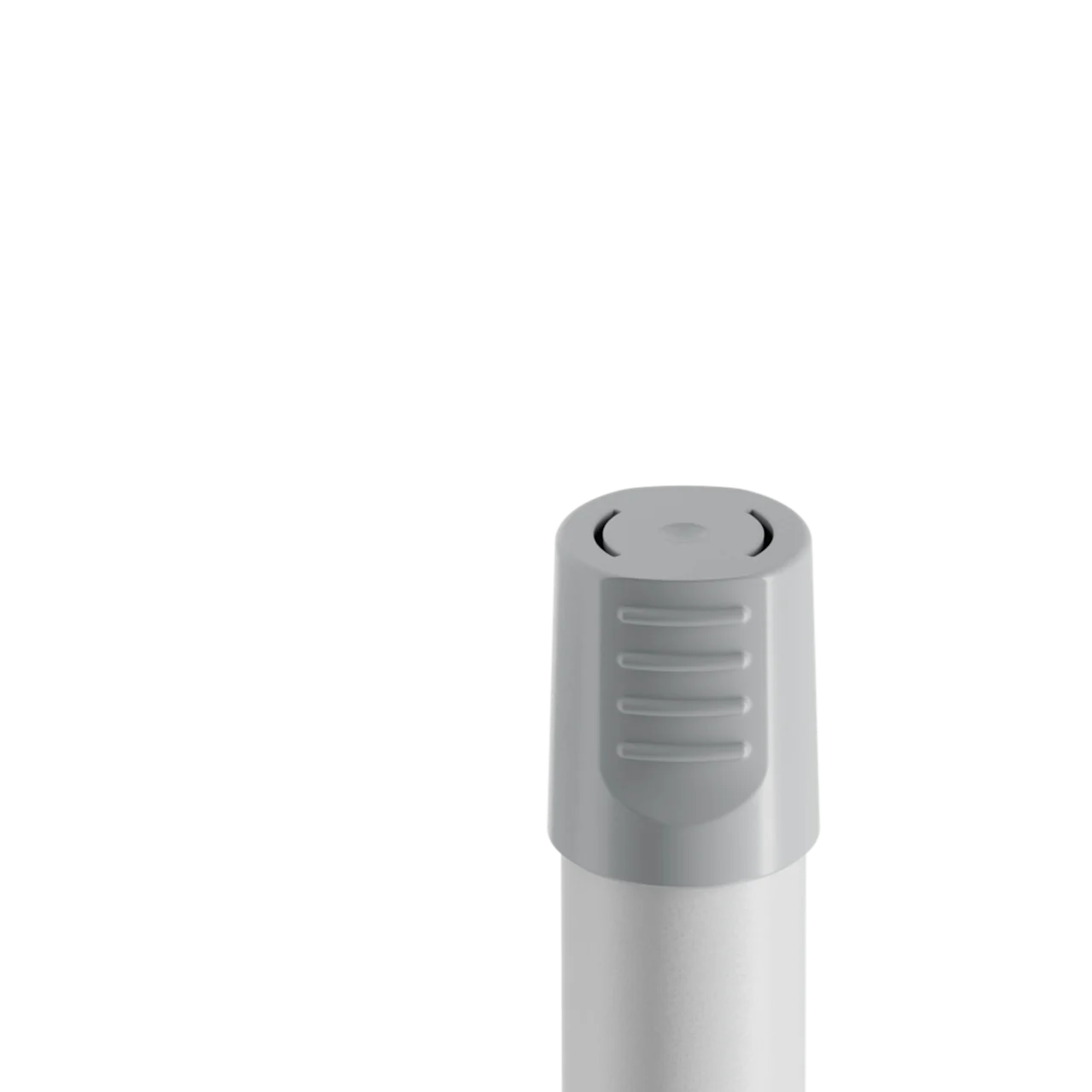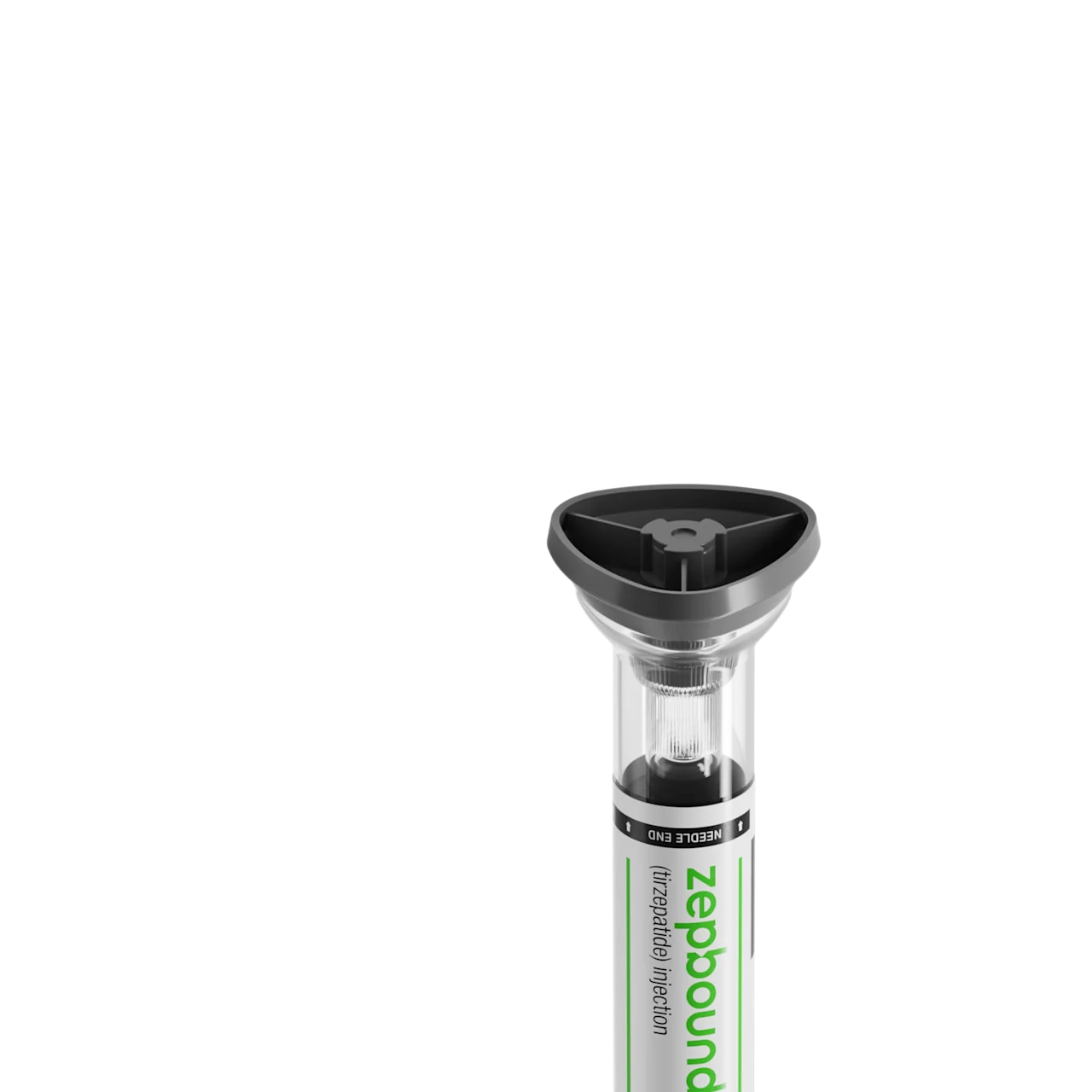Key takeaways
If you stop Wegovy, you may experience an increased appetite, a return of metabolic conditions, and the disappearance of side effects.
After stopping Wegovy, you may also regain some (if not most) of the weight you lost during treatment—that is, unless you have a good plan and healthy lifestyle habits in place.
Strategies for preventing rebound weight gain include regularly exercising, following a balanced (and often low-calorie) diet, staying hydrated, and getting ample sleep, among others.
Stopping Wegovy or other weight loss drugs should be a decision you should come to with the help of your healthcare provider.
Here's what we'll cover
Key takeaways
If you stop Wegovy, you may experience an increased appetite, a return of metabolic conditions, and the disappearance of side effects.
After stopping Wegovy, you may also regain some (if not most) of the weight you lost during treatment—that is, unless you have a good plan and healthy lifestyle habits in place.
Strategies for preventing rebound weight gain include regularly exercising, following a balanced (and often low-calorie) diet, staying hydrated, and getting ample sleep, among others.
Stopping Wegovy or other weight loss drugs should be a decision you should come to with the help of your healthcare provider.
There are many reasons someone might want to stop taking Wegovy (semaglutide), even if they’ve seen great results from this highly effective, injectable weight loss drug. But what happens when you stop taking Wegovy? Will you gain back all the weight you’ve lost? Will you experience Wegovy withdrawal symptoms?
Keep reading to get the full picture of what to expect if you decide to stop taking Wegovy—no matter why you may want to stop.
What happens when you stop Wegovy?
While no two weight loss journeys are the same, stopping Wegovy will likely lead to regaining some—or even most—of the weight lost while on the medication.
“When patients stop taking Wegovy, weight regain can begin within weeks to months, often due to the return of increased appetite and cravings,” says Alex Foxman, MD, a double board-certified physician in internal medicine and obesity medicine. “[Many] patients regain most or all of their lost weight within a year if no alternative strategy is in place.”
Clinical research supports that. A key study found that one year after stopping Wegovy, participants regained an average of two-thirds of the weight they’d lost on the drug. That’s not to say you will definitely gain weight post-treatment—or that staying on the medication just to avoid potential weight regain is the right choice. The decision to stop treatment should be made alongside your healthcare provider. And if you do end up deciding to ditch the drug? You’ll likely want to know what you can expect. So, let’s look at what happens when you stop taking Wegovy.
1. You can expect to regain weight
Hate to be the bearer of bad news yet again, but it’s possible you’ll regain some, if not most, of the weight you lost while taking Wegovy. Dr. Foxman’s experience supports this, showing that most patients who stop Wegovy regain the majority of the weight they lost during treatment.
A large clinical trial on Wegovy compared two groups. Both groups went on Wegovy for 20 weeks, at which point they lost an average of 10% of their body weight. Then, one group continued on Wegovy for another 48 weeks, losing an additional 8% of their weight from week 20. The other group stopped Wegovy after week 20, and over the following 48 weeks, they regained 7% of their weight compared to week 20, which is about half or more of the weight they had lost in the first place.
Some people may be surprised to hear that they’ll likely need to stay on Wegovy long-term to keep seeing its weight loss benefits. But it’s actually not so different from any other weight loss intervention.
Think about anyone you know who’s successfully lost weight through a healthy diet and exercise regimen. As long as they continue those efforts, their weight loss and weight management results should remain steady. If they return to a sedentary lifestyle and stop being careful of what they consume, they’ll likely regain that weight pretty quickly. (One large meta-analysis showed that, within five years of stopping any weight loss intervention, people regain around 80% of the weight they’d lost, on average).
Wegovy is no different. The drug doesn’t permanently change your anatomy (as is the case with some weight loss surgeries), so its effects may only continue for as long as you keep taking it. One of the keys to keeping the weight off when stopping Wegovy? Maintaining a healthy, fit lifestyle—think: exercising regularly, eating a nutritious diet, etc.—you (hopefully) started during treatment. But we’ll cover that in more detail soon.
2. Your appetite will likely increase
One of the primary ways Wegovy works is by decreasing appetite, so when you stop taking Wegovy, your appetite will likely return. That’s because Wegovy influences appetite through multiple mechanisms. As a glucagon-like peptide-1 receptor agonist (aka GLP-1), it mimics a natural hormone in the body that helps regulate hunger and digestion. One way it does this is by delaying gastric emptying, meaning food stays in the stomach longer, prolonging fullness. It also acts on areas of the brain involved in appetite regulation, reducing hunger signals and making you feel less inclined to eat.
3. You may see a return of metabolic conditions
“Beyond weight gain, stopping Wegovy may lead to a return of metabolic conditions like insulin resistance or hypertension,” Dr. Foxman says.
Obesity is associated with a wide range of metabolic conditions, including type 2 diabetes, heart disease, fatty liver disease, high blood pressure, and even many types of cancer. When someone with obesity loses a significant amount of excess weight, they often see a reversal of many of those metabolic conditions.
A 2021 clinical trial compared people who continued taking semaglutide (the active ingredient in Wegovy) against people who stopped it after week 20. Participants who continued on semaglutide saw significant improvements in conditions like hypertension, waist circumference, and hemoglobin A1C. The placebo group, which had seen some improvement in those arenas up to week 20, saw worsening of these conditions after stopping semaglutide and ended up regaining much of the weight they’d lost.
If you had any of those conditions before starting Wegovy, it’s important to check in regularly with your healthcare provider to keep tabs on your health.
4. Wegovy’s side effects should subside
Stopping Wegovy isn’t all bad for everyone who takes that route. While most people tend to be able to tolerate Wegovy side effects, especially after they get used to the medication, a small percentage of people find the side effects too uncomfortable to continue with treatment.
The most common side effects of Wegovy are gastrointestinal (GI) in nature and include symptoms like diarrhea, nausea, and vomiting. Clinical trials show that around 73% of people experience some level of GI side effects, but only about 4% of people stopped taking the drug because of this.
“Some patients report gastrointestinal relief from side effects like nausea after discontinuation,” Dr. Foxman says. Since side effects, especially GI symptoms, tend to be at their worst in the first few days after injecting the medication, you should see these start to subside within about a week of stopping Wegovy.
5. You may reverse signs of Wegovy face (aka Ozempic face)
While the term “Ozempic face” has gained popularity, the same phenomenon can happen with Wegovy—after all, the two drugs share the same active ingredient (semaglutide) and mechanisms of action.
In case you’re unfamiliar, Ozempic face is a nonmedical term that describes the wrinkling, sagging, and general volume loss in the face that can occur due to rapid weight loss. Your face holds a lot of fatty tissue, which helps keep the skin smooth and firm. But when you lose weight—especially quickly (which is often the case with Ozempic or Wegovy)—the fat in your face shrinks faster than your skin can adjust. This can lead to a drooping or wrinkled appearance.
Now, remember how you may regain weight when you stop taking Wegovy? While that news might not have been the most, err, exciting to hear, there is a plus side to the increase in pounds: the reduced appearance of Ozempic face. See, if you gain some weight back, the fat in your face can also return, helping to fill out loose skin and reduce sagging.
Wegovy withdrawal symptoms
Being that Wegovy is not addictive, stopping the medication won’t cause withdrawal symptoms in the sense of craving the substance or experiencing addiction-related effects (e.g. extreme headache, insomnia, body aches, restlessness, trouble concentrating). However, you may notice other changes in your body after discontinuing the medication.
Since Wegovy has a wide range of effects on the appetite, food cravings, and so-called “food noise“ (i.e. ruminating thoughts about food), when you stop Wegovy, you may notice these effects reversing. Meaning, you’ll likely see a “return of increased appetite and cravings,” as Dr. Foxman says. And if you struggled with food noise before taking Wegovy, it’s fair to assume you might experience that phenomenon again when stopping the medication (though the research on food noise is quite limited at this point).
Keeping weight off after Wegovy
If you need to stop Wegovy for any reason, you’re probably wondering how you can prevent all the weight you lost from coming back. Unfortunately, no easy fix can fully prevent this, but there are some strategies you could employ to boost your chances of sustaining the weight loss you experienced on Wegovy.
Exercise regularly
Wegovy is approved by the US Food and Drug Administration (FDA) for weight loss and management in combination with a reduced-calorie diet and increased physical activity. In other words, while the drug can promote weight loss in itself, it is most effective when used in tandem with the aforementioned lifestyle changes. So, it’s not all that surprising to learn that maintaining an exercise routine and consistently moving your body can help prevent rebound weight gain post-treatment.
Here’s the deal: Regular physical activity increases energy expenditure, making it easier to maintain a calorie balance even without the medication. Meanwhile, strength training can help retain and even build muscle, which can support a higher resting metabolic rate (read: ability to burn more calories at rest) and prevent the body from storing excess calories as fat.
The general recommendation for adults (such as that from the Centers for Disease Control and Prevention) is to aim for at least 150 minutes of moderate-intensity exercise per week. This should include a mix of cardio and resistance training.
Maintain a lower calorie intake
One of the primary ways Wegovy helps you lose weight is by slowing down your digestive system, which decreases appetite and helps you take in fewer calories. After stopping Wegovy, your appetite may increase, which could make it more difficult to maintain the lower calorie intake that contributed to your weight loss and, in turn, potentially lead to weight regain.
Now, following a reduced-calorie diet can often be easier said than done. We get it. That’s why it’s important to find ways to help yourself feel full without taking in extra calories. Packing your plate with lean proteins (e.g. chicken, turkey, salmon, eggs), for example, can help curb hunger and keep you satisfied for longer. That’s because protein takes longer to digest and helps regulate appetite hormones. Filling up on fiber can also help keep weight off after stopping Wegovy. High-fiber foods, such as fruits, vegetables, legumes, and whole grains, can all slow digestion and promote a lasting feeling of fullness, making it easier to stick to a lower-calorie diet.
Consider another medication
Whether there’s a drug shortage or the medication is just too costly, there are plenty of reasons you might want to stop taking Wegovy. Before you ditch the drug, however, it might be worth discussing alternative treatments with your healthcare provider.
There are other weight loss drugs on the market you could try, the most effective of which is Zepbound (tirzepatide). This medication is a GLP-1/GIP receptor agonist, which is commonly grouped with GLP-1 receptor agonists like Wegovy, even though they differ in one key way. GLP-1/GIP receptor agonists mimic two hormones, as opposed to just one, which may help explain their superior effects on blood sugar control and weight loss. One large study of over 18,000 participants found that, compared to semaglutide (the active ingredient in Wegovy), tirzepatide resulted in significantly more weight loss, with about the same amount of side effects.
Follow weight loss best practices
To increase your chances of keeping weight off after stopping Wegovy, it’s important to follow some key practices, such as:
Prioritize consistency over perfection. The specific type of exercise matters less than your ability to stick with it. Choose activities you enjoy, feel comfortable doing, and can make a regular part of your routine.
Stay hydrated. Drinking water may help curb cravings and help manage hunger cues that may increase after stopping Wegovy, making it easier to navigate post-treatment appetite changes. Plus, sipping on unflavored H20 (whether still or sparkling) has also been found to help digestion, promote alertness, and boost mood—all of which can benefit overall health and help aid weight loss and management.
Score ample shut-eye. Poor sleep is associated with higher body weight, increased appetite, and insulin sensitivity. As if that’s not enough to encourage you to get more zzz’s, know this: getting 7–9 hours of sleep per night has been linked to key physiological benefits that can help with weight loss: improved appetite regulation, reduced cravings, and a healthy metabolism.
Get support as needed. Many people find that working with a therapist, joining a support group, or employing other behavioral strategies can make a big difference in their weight loss and maintenance. If you’re struggling to reach your goals or with something else, resources are available—you don’t have to navigate it alone.
Do the side effects of Wegovy go away after stopping?
The side effects of Wegovy should fade when you stop taking the medication.
Since Wegovy affects the digestive system, it most commonly causes GI side effects, like nausea, diarrhea, constipation, heartburn, and bloating. Most people tend to tolerate these side effects pretty well, but about 4% of people in clinical trials stopped taking Wegovy because the side effects were too disruptive.
Sound familiar? If you (with the support of and guidance from your healthcare provider) decide to stop taking Wegovy because of the side effects, you’re probably wondering how quickly you can expect the symptoms to stop. Good news: It should only take about a week after your last injection of Wegovy for the side effects to start subsiding since the drug has a half-life of about one week. It can take up to five weeks for the drug to clear out of your system, but most of the GI side effects only last for a couple of days after each injection, so you can rest easy that any discomfort you’ve been feeling on Wegovy should go away rather quickly after stopping.
Do you have to wean off of Wegovy?
There’s no need to taper off of Wegovy if you want to stop taking it, but “gradual dose reduction may help ease appetite rebound,” Dr. Foxman says.
If you do taper your dose, you may also find that you experience fewer side effects at a lower dose—after all, research shows the side effects of semaglutide drugs to be dose-dependent. But remember, you should not take matters into your own hands and start tapering your dose on your own with the goal of ultimately stopping Wegovy. Instead, you should consult your healthcare provider and follow their instructions—that is, of course, if you both decide that stopping treatment is a safe and smart choice for you.
When should you stop Wegovy?
Wegovy is designed to be used long-term, so it’s generally considered safe to use it indefinitely. There are a number of reasons you might stop taking it, though. We’ve already covered some of the most common reasons: side effects, cost, and availability.
Talk to your healthcare provider about your options before stopping Wegovy. They’ll likely be able to help you find a happy medium to help you reach your goals. If pricing is a factor in your decision to stop (if you can’t get insurance coverage), there may be more affordable options.
In rare cases, some people develop serious side effects that force them to stop taking Wegovy. Specific examples include:
Acute pancreatitis (inflammation of the pancreas)
Acute gallbladder disease (including gallstones)
Acute kidney injury
Suicidal ideation (including sudden changes in your mood, behaviors, thoughts, or feelings)
These side effects are very rare, but if they happen, your healthcare provider will recommend you stop Wegovy right away and find an alternative for weight loss.
If you are experiencing symptoms that you believe need immediate medical attention, don’t wait for your provider to respond to your message. You should seek emergency medical treatment and let your provider know afterward.
Stopping Wegovy is a decision you and your provider should make together to ensure you have the best plan of action moving forward.
How to safely stop Wegovy
If you and your healthcare provider decide that stopping Wegovy is right for you, it’s important to take the recommended steps to increase your likelihood of success.
“For those wanting to stop Wegovy, I recommend transitioning to an alternative GLP-1 agonist or combining lifestyle strategies, such as structured nutrition, strength training, and behavioral therapy to maintain weight loss,” Dr. Foxman says.
Work with your provider to develop a plan of action that will work for you, and check in with them regularly.
“Though lifestyle changes are critical for long-term success,” Dr. Foxman adds, “the scientific evidence currently shows that most patients stopping Wegovy will regain most of their weight within a year.” That’s not to discourage you, though. Dr. Foxman reminds us that obesity or excess weight “is a chronic medical condition and requires chronic treatment to keep it in remission.” The important thing is finding the long-term treatments that are right for you.
Rx weight loss with Ro
Get access to prescription weight loss medication online
Bottom line
Wegovy is meant to be taken long-term for chronic weight management, but if you decide you want to stop, it’s important to have realistic expectations. So, what happens when you stop taking Wegovy? While we answered that in full above, let’s do a quick recap:
When you stop taking Wegovy, you may regain much of the weight you lost and see a return of metabolic conditions (like diabetes or heart disease) as a result. You may also experience an increase in appetite.
If you are looking to stop because you’re finding the medication’s side effects to be intolerable, know that such symptoms should dissipate fairly quickly (~one week) after your last injection. This is thanks to Wegovy’s relatively short half-life.
While there’s no one-size-fits-all approach to fully avoiding weight regain post-treatment, there are a handful of strategies that may help you prevent, err, additional poundage. These include exercising regularly, following a nutritious diet that may also be low in calories, and staying hydrated, among others.
If you’re considering stopping Wegovy, be sure to consult your healthcare provider and do not take matters into your own hands (i.e. stopping the drug abruptly by yourself). Your provider is best equipped to help you navigate changes in your treatment. They may also recommend Wegovy alternatives and potentially making the switch to another medication, such as Zepbound.
DISCLAIMER
If you have any medical questions or concerns, please talk to your healthcare provider. The articles on Health Guide are underpinned by peer-reviewed research and information drawn from medical societies and governmental agencies. However, they are not a substitute for professional medical advice, diagnosis, or treatment.
Wegovy Important Safety Information: Read more about serious warnings and safety info.
GLP-1 Important Safety Information: Read more about serious warnings and safety info.
Ozempic Important Safety Information: Read more about serious warnings and safety info.
Zepbound Important Safety Information: Read more about serious warnings and safety info.
References
Centers for Disease Control and Prevention (CDC). (n.d.). Physical activity for a healthy weight. Retrieved from https://www.cdc.gov/healthy-weight-growth/physical-activity/index.html
Cooper, C. B., Neufeld, E. V., Dolezal, B. A., & Martin, J. L. (2018). Sleep deprivation and obesity in adults: a brief narrative review. BMJ Open Sport & Exercise Medicine, 4(1), e000392. doi: 10.1136/bmjsem-2018-000392. Retrieved from https://pubmed.ncbi.nlm.nih.gov/30364557/
Gupta, M., Gokarakonda, S. B., Regina, A. C., et al. (2024). Withdrawal syndromes. StatPearls. Retrieved on Feb. 28, 2025 from https://www.ncbi.nlm.nih.gov/books/NBK459239/
Hayashi, D., Edwards, C., Emond, J. A., et al. (2023). What is food noise? a conceptual model of food cue reactivity. Nutrients, 15(22), 4809. doi: 10.3390/nu15224809. Retrieved from https://pmc.ncbi.nlm.nih.gov/articles/PMC10674813/
Hendershot, C. S., Bremmer, M. P., Paladino, M. B., et al. (2025). Once-weekly semaglutide in adults with alcohol use disorder: a randomized clinical trial. JAMA Psychiatry, e244789. Advance online publication. doi: 10.1001/jamapsychiatry.2024.4789. Retrieved from https://pubmed.ncbi.nlm.nih.gov/39937469/
Humphrey, C. D. & Lawrence, A. C. (2023). Implications of Ozempic and other semaglutide medications for facial plastic surgeons. Facial Plastic Surgery : FPS, 39(6), 719–721. doi: 10.1055/a-2148-6321. Retrieved from https://pubmed.ncbi.nlm.nih.gov/37541662/
Jabbour, S., Paik, J. S., Aleppo, G., et al. (2024). Switching to Tirzepatide 5 mg From Glucagon-Like Peptide-1 Receptor Agonists: Clinical Expectations in the First 12 Weeks of Treatment. Endocrine Practice : Official Journal of the American College of Endocrinology and the American Association of Clinical Endocrinologists, 30(8), 701–709. doi: 10.1016/j.eprac.2024.05.005. Retrieved from https://www.endocrinepractice.org/article/S1530-891X(24)00515-9/fulltext
Pillarisetti, L. & Agrawal, D. K. (2025). Semaglutide: double-edged sword with risks and benefits. Archives of Internal Medicine Research, 8(1), 1–13. doi: 10.26502/aimr.0189. Retrieved from https://pmc.ncbi.nlm.nih.gov/articles/PMC11790292/
Rodriguez, P.J., Goodwin Cartwright, B.M., Gratzl, S., et al. (2024). Semaglutide vs tirzepatide for weight loss in adults with overweight or obesity. JAMA Internal Medicine, 184(9), 1056–1064. doi: 10.1001/jamainternmed.2024.2525. Retrieved from https://jamanetwork.com/journals/jamainternalmedicine/fullarticle/2821080
Ruegsegger, G. N. & Booth, F. W. (2018). Health benefits of exercise. Cold Spring Harbor Perspectives in Medicine, 8(7), a029694. doi: 10.1101/cshperspect.a029694. Retrieved from https://pubmed.ncbi.nlm.nih.gov/28507196/
Singh, G., Krauthamer, M., & Bjalme-Evans, M. (2022). Wegovy (semaglutide): a new weight loss drug for chronic weight management. Journal of Investigative Medicine: The Official Publication of the American Federation for Clinical Research, 70(1), 5–13. doi: 10.1136/jim-2021-001952. Retrieved from https://www.ncbi.nlm.nih.gov/pmc/articles/PMC8717485/
Strasser, B. (2013). Physical activity in obesity and metabolic syndrome. Annals of the New York Academy of Sciences, 1281(1), 141–159. doi: 10.1111/j.1749-6632.2012.06785.x. Retrieved from https://pmc.ncbi.nlm.nih.gov/articles/PMC3715111/
Swift, D. L., Johannsen, N. M., Lavie, C. J., et al. (2014). The role of exercise and physical activity in weight loss and maintenance. Progress In Cardiovascular Diseases, 56(4), 441-447. doi: 10.1016/j.pcad.2013.09.012. Retrieved from https://pmc.ncbi.nlm.nih.gov/articles/PMC3925973/
U.S. Food and Drug Administration (FDA). (2021-a). FDA approves new drug treatment for chronic weight management, first since 2014. FDA News Release. Retrieved on Mar. 21, 2023 from https://www.fda.gov/news-events/press-announcements/fda-approves-new-drug-treatment-chronic-weight-management-first-2014
U.S. Food and Drug Administration (FDA). (2021-b). WEGOVY (semaglutide) injection, for subcutaneous use. Retrieved on Mar. 21, 2023 from https://www.accessdata.fda.gov/drugsatfda_docs/label/2021/215256s000lbl.pdf
Wharton, S., Calanna, S., Davies, M., et al. (2022). Gastrointestinal tolerability of once-weekly semaglutide 2.4 mg in adults with overweight or obesity, and the relationship between gastrointestinal adverse events and weight loss. Diabetes, Obesity & Metabolism, 24(1), 94–105. doi: 10.1111/dom.14551. Retrieved from https://pubmed.ncbi.nlm.nih.gov/34514682/
Wilding, J. P. H., Batterham, R. L., Calanna, S., et al. (2021). Once-weekly semaglutide in adults with overweight or obesity. New England Journal of Medicine, 384, 989-1002. doi: 10.1056/NEJMoa2032183. Retrieved from https://www.nejm.org/doi/10.1056/NEJMoa2032183
Wilding, J. P. H., Batterham, R. L., Davies, M., et al. (2022). Weight regain and cardiometabolic effects after withdrawal of semaglutide: The STEP 1 trial extension. Diabetes, Obesity, and Metabolism, 24(8), 1553-1564. doi: 10.1111/dom.14725. Retrieved from https://dom-pubs.onlinelibrary.wiley.com/doi/10.1111/dom.14725
Yang, M., Liu, S., & Zhang, C. (2022). The related metabolic diseases and treatments of obesity. Healthcare (Basel, Switzerland), 10(9), 1616. doi: 10.3390/healthcare10091616. Retrieved from https://pmc.ncbi.nlm.nih.gov/articles/PMC9498506/



